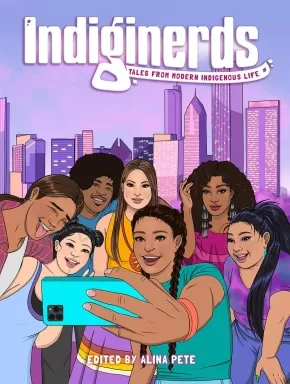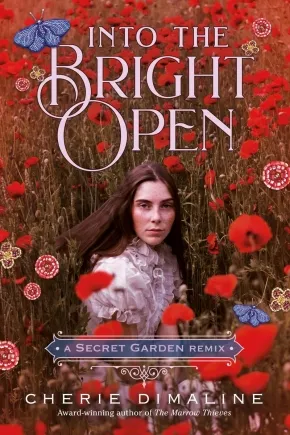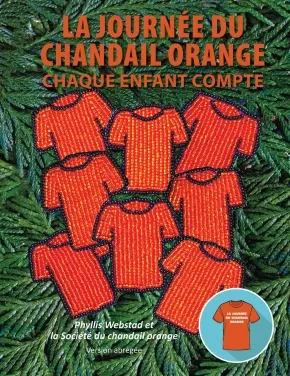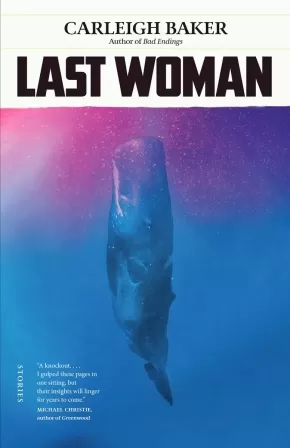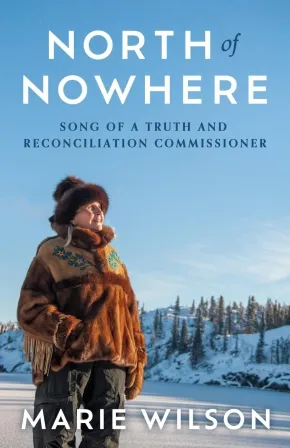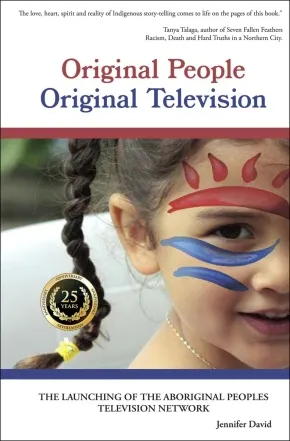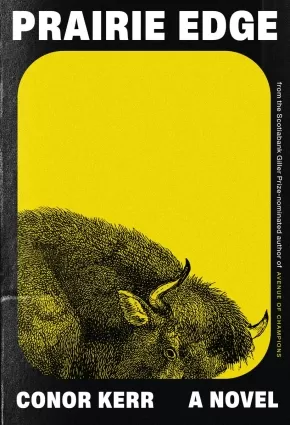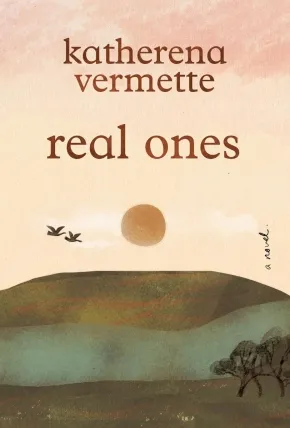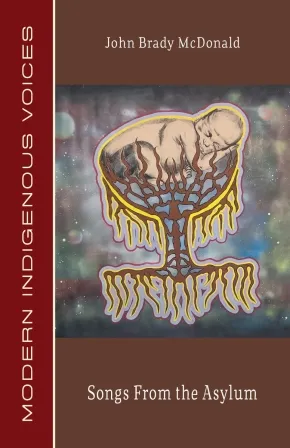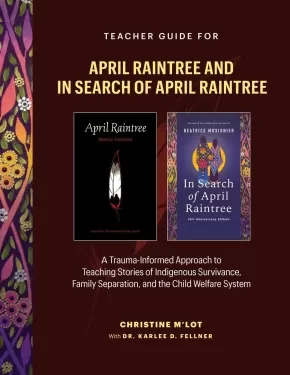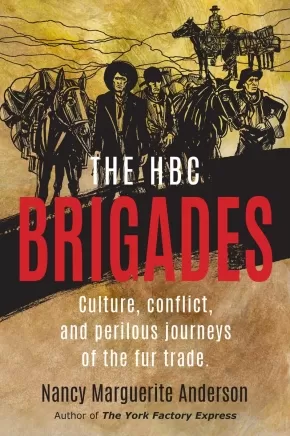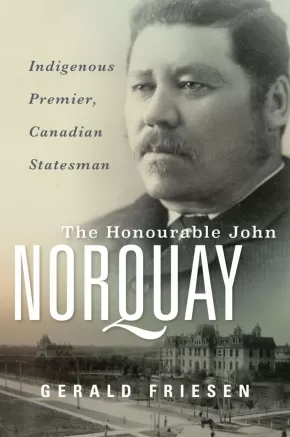
Métis
31
-
45
of
178 Results;
Sort By
Go To
of 12
Indiginerds: Tales from Modern Indigenous Life
$30.95
Artists:
Format:
Paperback
Text Content Territories:
Indigenous Canadian;
ISBN / Barcode: 9781638991335
Synopsis:
Synopsis:
First Nations culture is living, vibrant, and evolving, and generations of Indigenous kids have grown up with pop culture creeping inexorably into our lives. From gaming to social media, pirate radio to garage bands, Star Trek to D&D, and missed connections at the pow wow, Indigenous culture is so much more than how it’s usually portrayed. Indiginerds is here to celebrate those stories!
Featuring an all-Indigenous creative team, Indiginerds is an exhilarating anthology collecting 11 stories about Indigenous people balancing traditional ways of knowing with modern pop culture. Includes work by Alina Pete, PJ Underwood, Kameron White, Rhael McGregory, and many more.
Educator Information
Recommended for ages 12 to 18.
Full Creator Listing: Tate Allen, Ida Aronson, Jordanna George, Raven John, Nipinet Landsem, Rhael McGregor, Sam “Mushki” Medlock, Alina Pete, Wren Rios, PJ Underwood, Kameron White
Additional Information
120 pages | 6.62" x 10.25" | Paperback
Into the Bright Open: A Secret Garden Remix (PB)
$16.99
Format:
Paperback
Text Content Territories:
Indigenous Canadian; Métis;
ISBN / Barcode: 9781250842640
Synopsis:
Synopsis:
In the Remixed Classics series, authors from marginalized backgrounds reinterpret classic works through their own cultural lens to subvert the overwhelming cishet, white, and male canon. This queer YA reimagining of The Secret Garden subverts the cishet and white status quo of the original in a tale of family secrets wonderful and horrifying.
Mary Lennox didn’t think about death until the day it knocked politely on her bedroom door and invited itself in. When a terrible accident leaves her orphaned at fifteen, she is sent to the wilderness of the Georgian Bay to live with an uncle she's never met.
At first the impassive, calculating girl believes this new manor will be just like the one she left in Toronto: cold, isolating, and anything but cheerful, where staff is treated as staff and never like family. But as she slowly allows her heart to open like the first blooms of spring, Mary comes to find that this strange place and its strange people—most of whom are Indigenous—may be what she can finally call home.
Then one night Mary discovers Olive, her cousin who has been hidden away in an attic room for years due to a "nervous condition." The girls become fast friends, and Mary wonders why this big-hearted girl is being kept out of sight and fed medicine that only makes her feel sicker. When Olive's domineering stepmother returns to the manor, it soon becomes clear that something sinister is going on.
With the help of a charming, intoxicatingly vivacious Metis girl named Sophie, Mary begins digging further into family secrets both wonderful and horrifying to figure out how to free Olive. And some of the answers may lie within the walls of a hidden, overgrown and long-forgotten garden the girls stumble upon while wandering the wilds...
Reviews
"Racism, colonization, and a love of nature are central themes gracefully woven into the story. An aching and emotionally immersive queer romance, unhampered by homophobia, unfolds through lush imagery blended with poignant and elegant prose. A rich and verdant revival of a classic." —Kirkus Reviews, starred review
Educator & Series Information
This book is recommended for ages 13 to 18.
This book is part of the Remixed Classics series.
Additional Information
304 pages | 5.52" x 8.24" | Paperback
La journee du chandail orange: Chaque enfant compte
$19.99
Format:
Paperback
Text Content Territories:
Indigenous Canadian; First Nations; Inuit; Métis;
ISBN / Barcode: 9781778540400
Synopsis:
Synopsis:
A special abridged version of the award-winning book Orange Shirt Day: September 30th. Orange Shirt Day, observed annually on September 30th, is also known as the National Day for Truth and Reconciliation. It is an official day to honour Residential School Survivors and their families, and to remember the children who did not come home. What was initially envisioned as a way to keep the conversations going about all aspects of Residential Schools in Williams Lake and the Cariboo Region of British Columbia, Canada, has now expanded into a movement across Turtle Island and beyond. Orange Shirt Day: Every Child Matters aims to create champions who will walk a path of reconciliation and promote the message that 'Every Child Matters'. This version also explores a number of important topics including the historical, generational, and continual impacts of Residential Schools on Indigenous Peoples, the journey of the Orange Shirt Day movement, and how you can effectively participate in the National Day for Truth and Reconciliation. With end of chapter reflection questions and a series of student art submissions, readers are guided to explore how they, and others, view and participate in Residential School reconciliation.
Educator Information
Recommended for ages 12 to 17.
This book is available in English: Orange Shirt Day: Every Child Matters: Condensed Edition
Additional Information
112 pages | 8.46" x 10.97" | Paperback
Last Woman: Stories
$24.95
Format:
Paperback
Text Content Territories:
Indigenous Canadian;
Reading Level: N/A
ISBN / Barcode: 9780771004148
Synopsis:
Synopsis:
From one of the country’s most celebrated new writers, a blistering collection of short fiction that is bracingly relevant, playfully irreverent, and absolutely unforgettable.
There’s a hole in the ozone layer. Are teenage girls to blame?
Floods and wildfires, toxic culture, billionaires in outer space, or a purse-related disaster while on mushrooms—in today’s hellscape world, there’s no shortage of things to worry about. Last Woman, the new collection of short fiction by award-winning author Carleigh Baker, wants you to know that you’re not alone. In these 13 brilliant new stories, Baker and her perfectly-drawn characters are here for you—in fact, they’re just as worried and weirded-out as everyone else.
A woman’s dream of poetic solitude turns out to be a recipe for loneliness. A retiree is convinced that his silence is the only thing that will prevent a deadly sinkhole. An emerging academic wakes up and chooses institutional violence. A young woman finds sisterhood in a strange fertility ritual, and an enigmatic empath is on a cleanse. Baker’s characters are both wildly misguided and a product of the misguided times in which we live. Through them we see our world askew and skewered—and, perhaps, we can begin to see it anew.
Carleigh Baker’s signature style is irreverent, but her heart is true—these stories delve into fear for the future, intergenerational misunderstandings, and the complexities of belonging with sharp wit and boundless empathy. With equal parts compassion and critique, she brings her clear-eyed attention to bear on our world, and the results are hilarious, heartbreaking, and startling in their freshness.
Reviews
“Carleigh Baker’s Last Woman is a knockout. These fifteen stories are probing contemplations on technology, the climate crisis, childhood, adulthood, parenthood, dreams, identity, creativity, and those staggering moments when the uncanny burbles up through the cracks of everyday experience. I gulped these pages in one sitting, but their insights will linger for years to come.”—Michael Christie, author of Greenwood
“Carleigh Baker’s Last Woman is a satirical, energetic look at our messed-up world. The stories in this collection ask original, surprising what-if questions, exploring disasters small and large, personal and public, and the past, present, and future of this planet—and beyond. I’m so impressed with Baker’s ability to craft such a range of voices, by turns funny and vulnerable and exuberant and idiosyncratic. These stories are inventive, a little weird, and very, very cool.”—Shashi Bhat, author of The Most Precious Substance on Earth
Additional Information
208 pages | 5.18" x 8.00" | Paperback
Les pensionnats indiens: Effets dévastateurs sur les peuples autochtones du Canada et appels à l'action de la Commission de vérité et réconciliation
$45.00
Format:
Paperback
Text Content Territories:
Indigenous Canadian; First Nations; Inuit; Métis;
ISBN / Barcode: 9781459419667
Synopsis:
Synopsis:
The award-winning Righting Canada's Wrongs series is now available in French for Immersion classrooms.
Canada’s residential school system for Indigenous children is now recognized as a grievous historic wrong committed against First Nations, Métis and Inuit peoples. Through historical photographs, documents and first-person narratives from people who survived residential schools, this book offers an account of the injustice of this period in Canadian history. It documents how official racism was confronted and finally acknowledged.
In 1857, the Gradual Civilization Act was passed in Canada with the aim of assimilating Indigenous people. In 1879, Prime Minister Sir John A. Macdonald commissioned a report that led to residential schools across Canada. First Nations and Inuit children were taken from their families and sent to residential schools where they were dressed in uniforms, their hair was cut, they were forbidden to speak their native language and they were often subjected to physical and psychological abuse. The schools were run by churches and funded by the federal government.
The last federally funded residential school closed in 1996. The horrors that many children endured at residential schools did not go away. It took decades for people to speak out, but with the support of the Assembly of First Nations and Inuit organizations, former residential school students took the federal government and the churches to court.
Their cases led to the Indian Residential Schools Settlement Agreement, the largest class-action settlement in Canadian history. In 2008, Prime Minister Harper formally apologized to former native residential school students for the atrocities they suffered and the role the government played in setting up the school system. The agreement included the Truth and Reconciliation Commission, which has worked to document the experience. More than five years after the TRC Report was released, there have been reports of unmarked graves of children being discovered at the site of former residential schools. This updated edition includes some of those findings and examines what has and what still has to be done in regards to the TRC Report’s Calls to Action.
Educator & Series Information
This French book is part of the series Redresser les torts du Canada (Righting Canada's Wrongs series).
Recommended for ages 13 to 18.
This book is available in English: Righting Canada's Wrongs: Residential Schools: The Devastating Impact on Canada's Indigenous Peoples and the Truth and Reconciliation Commission's Findings and Calls for Action
Additional Information
8.50" x 11.69" | 300 Photographs | Paperback
Métis Matriarchs: Agents of Transition
$34.95
Editors:
Format:
Paperback
Text Content Territories:
Indigenous Canadian; Métis;
Reading Level: N/A
ISBN / Barcode: 9781779400116
Synopsis:
Synopsis:
Explores the integral roles that Métis women assumed to ensure the survival of their communities during the fur trade era and onward
Métis Matriarchs examines the roles of prominent Métis women from across Western Canada from the late 19th to the mid-20th century, providing a rare glimpse into the everyday lives of these remarkable women who were recognized as Matriarchs and respected for their knowledge, expertise, and authority within their families and communities.
This edited collection provides an opportunity to learn about the significant contributions made by Métis women during a transitional period in Western Canadian history as the fur trade gave way to a more sedentary, industrialized, and agrarian economy. Challenging how we think about Western Canadian settlement processes that removed Indigenous peoples from the land, this collection of stories examines the ways Métis matriarchs responded to colonial and settler colonial interventions into their lives and livelihoods and ultimately ensured the cultural survival of their communities.
Awards
- 2025 Canadian Historical Association Indigenous History Book Prize
Reviews
“A nuanced account of the lives of Métis women and their vital roles as they helped guide their families and communities through generations of transitions.” —Michel Hogue, author of Metis and the Medicine Line
Additional Information
336 pages | 5.00" x 8.00"| Paperback
North of Nowhere: Song of a Truth and Reconciliation Commissioner
$34.99
Format:
Hardcover
Text Content Territories:
Indigenous Canadian; First Nations; Inuit; Métis;
ISBN / Barcode: 9781487011482
Synopsis:
Synopsis:
The incomparable first-hand account of the historic Truth and Reconciliation Commission of Canada told by one of the commissioners who led it.
The Truth and Reconciliation Commission was established to record the previously hidden history of more than a century of forced residential schooling for Indigenous children. Marie Wilson helped lead that work as one of just three commissioners. With the skills of a journalist, the heart of a mother and grandmother, and the insights of a life as the spouse of a residential school survivor, Commissioner Wilson guides readers through her years witnessing survivor testimony across the country, providing her unique perspective on the personal toll and enduring public value of the commission. In this unparalleled account, she honours the voices of survivors who have called Canada to attention, determined to heal, reclaim, and thrive.
Part vital public documentary, part probing memoir, North of Nowhere breathes fresh air into the possibilities of reconciliation amid the persistent legacy of residential schools. It is a call to everyone to view the important and continuing work of reconciliation not as an obligation but as a gift.
Reviews
"I found Marie Wilson's North of Nowhere profoundly moving and surprisingly optimistic. With humility and wisdom, she takes us behind the scenes of the Truth and Reconciliation Commission. As a non-Indigenous woman long settled in the North, she has a unique viewpoint, and she leavens an account of the traumatic intergenerational impact of residential schools with details from her own personal story. Wilson goes beyond the grief and misery triggered by the Truth aspect of the TRC to suggest the joy and laughter that true Reconciliation can produce in survivors. But reconciliation will be achieved only if we don't look away. North of Nowhere is a powerful book that shifted my perspective, and, thanks to Wilson's lucid prose, helps the rest of us glimpse what is needed." — Charlotte Gray (CM), author of Passionate Mothers, Powerful Sons: The Lives of Jennie Jerome Churchill and Sara Delano Roosevelt
"For anyone wanting a front row seat to the Spirit, the vision, and the mechanics of the Truth and Reconciliation Commission of Canada, North of Nowhere is definitely it. Commissioner Dr. Marie Wilson recounts and celebrates the courage of everyone involved in one of Canada's most important chapters of coming to terms with residential school Survivors and their families and their communities forever changed with a policy of cultural genocide. I hope everyone reads this and finds their way to support Survivors, their families, and their communities as they continue to reclaim so much of what was stolen. What a profound and riveting read." — Richard Van Camp, author of The Lesser Blessed and Godless but Loyal to Heaven
"The long-matured work of a true elder, this magnificent book is a sober masterpiece of sacred activism. It deserves to be read by everyone aghast at the chaos and cruelty of our world. Its level decency of tone, its lucidity, its determined hope in terrible circumstances both transmit and model those qualities we all now need to build a new world out of the smouldering ashes of the old." — Andrew Harvey, author of The Hope: A Guide to Sacred Activism
"In North of Nowhere, Marie Wilson honours her vow to residential school Survivors to 'do no harm' and to bear witness to and honour their experiences. Marie has achieved her purpose to educate readers and inspire reconciliation and, most importantly, hope. 'I see you. I hear you. I believe you. And I love you'-Marie's words as a Commissioner to Survivors set the tone for this very important book." — Perry Bellegarde, former National Chief of the Assembly of First Nations
"This book is one of the best I've ever read. It made me laugh, get emotional, and helped reset my journey on the role I need to play. As a child of residential school Survivors, I was motivated to continue to learn my language and strengthen my pride as an Indigenous person. Truth must come before reconciliation; this book will empower Canadians to focus on what we can control today when it comes to implementing the Calls to Action. This book advocates for building awareness, understanding, and long-term relationships between Indigenous people and Canadians. If every Canadian reads this book, the Truth and Reconciliation Calls to Action can be achieved." — Cadmus Delorme, former chief of Cowessess First Nation
"Journalist Marie Wilson brings us into the emotion-charged rooms, the sacred spaces of Canada's Truth and Reconciliation hearings. She listens with the heart of a mother, looking into the souls of the adult Survivors standing before her and seeing the children they once were. Though she holds nothing back, in the end this is a triumphant, restorative narrative-a testament to the healing that happens when we share our deepest, darkest truths." — Judy Rodgers, founding director of Images & Voice of Hope, board member of The Peace Studio
"North of Nowhere is the story of a national soul-searching, braided with Dr. Marie Wilson's own personal story and her unique perspective as a Truth and Reconciliation Commissioner. Every page tells a story. This is a book that is bound to ignite dialogue. It has been a catalyst that has been the spark for numerous visits, deep discussions, and reflections, which is why we wanted to write a collective review. Marie's writing had us thinking and talking about the stories, truths, and wisdom shared throughout the pages. Through her writing, Marie elicits emotional and insightful responses that move us along our own journeys of understanding the truth of Canada." — Shelagh Rogers and Monique Gray Smith
"Marie Wilson is the truth keeper entrusted with the accounts of the First Nations, Métis, and Inuit children who went to residential schools, the memories of those who did not make it home and the fate of us all if we do not learn from the past. The savagery of 'civilization' comes into stark relief as children emerge from the pages to awaken the national consciousness and render the TRC Calls to Action imperative." — Cindy Blackstock, executive director, First Nations Child & Family Caring Society
"Beautifully written, Marie Wilson's North of Nowhere is a stunning work of truth, power, and wisdom. An imperative read for all Canadians to understand the layers of shrapnel left by the residential school system that will leave you with emotion and hope. Wilson is an incredibly brilliant and gifted writer." — Angela Sterritt, author of Unbroken: My Fight for Survival, Hope, and Justice for Indigenous Women and Girls
Educator Information
Curriculum Connections: Social Science, Ethnic Studies, Canadian Studies, Indigenous STudies
Additional Information
384 pages | 6.00" x 9.00" | Hardcover
Original People, Original Television: The Launching of the Aboriginal Peoples Television Network (Special Edition)
$28.95
Format:
Paperback
Text Content Territories:
Indigenous Canadian; First Nations; Inuit; Métis;
Reading Level: N/A
ISBN / Barcode: 9781926886626
Synopsis:
Synopsis:
Original People, Original Television is the behind-the-scenes account of a little known revolution in Canadian broadcasting—a journey begun in 1922 with Nanook of the North, wending its way across generations and the width and breadth of the traditional territories of the Inuit, First Nations and Métis; culminating in the 1999 launch of the world’s inaugural Indigenous led broadcast, the Aboriginal Peoples’ Television Network.
Additional Information
282 pages | 9.00" x 6.00" | b&w photos, index, bibliography | Special Edition | Paperback
Prairie Edge: A Novel
$24.95
Format:
Paperback
Text Content Territories:
Indigenous Canadian; Métis;
Reading Level: N/A
ISBN / Barcode: 9780771003578
Synopsis:
Synopsis:
The Giller Prize-longlisted author of Avenue of Champions returns with a frenetic, propulsive crime thriller that doubles as a sharp critique of modern activism and challenges readers to consider what “Land Back” might really look like.
Meet Isidore “Ezzy” Desjarlais and Grey Ginther: two distant Métis cousins making the most of Grey’s uncle’s old trailer, passing their days playing endless games of cribbage and cracking cans of cheap beer in between. Grey, once a passionate advocate for change, has been hardened and turned cynical by an activist culture she thinks has turned performative and lazy. One night, though, she has a revelation, and enlists Ezzy, who is hopelessly devoted to her but eager to avoid the authorities after a life in and out of the group home system and jail, for a bold yet dangerous political mission: capture a herd of bison from a national park and set them free in downtown Edmonton, disrupting the churn of settler routine. But as Grey becomes increasingly single-minded in her newfound calling, their act of protest puts the pair and those close to them in peril, with devastating and sometimes fatal consequences.
For readers drawn to the electric storytelling of Morgan Talty and the taut register of Stephen Graham Jones, Conor Kerr’s Prairie Edge is at once a gripping, darkly funny caper and a raw reckoning with the wounds that persist across generations.
Additional Information
272 pages | 5.50" x 8.25" | Paperback
real ones: a novel (HC) (2 in Stock)
$35.00
Format:
Hardcover
Text Content Territories:
Indigenous Canadian | Métis|
Reading Level: N/A
ISBN / Barcode: 9780735247505
Synopsis:
Synopsis:
From the author of the nationally bestselling Strangers saga comes a heartrending story of two Michif sisters who must face their past trauma when their mother is called out for false claims to Indigenous identity.
June and her sister, lyn, are NDNs—real ones.
Lyn has her pottery artwork, her precocious kid, Willow, and the uncertain terrain of her midlife to keep her mind, heart and hands busy. June, a Métis Studies professor, yearns to uproot from Vancouver and move. With her loving partner, Sigh, and their faithful pup, June decides to buy a house in the last place on earth she imagined she’d end up: back home in Winnipeg with her family.
But then into lyn and June’s busy lives a bomb drops: their estranged and very white mother, Renee, is called out as a “pretendian.” Under the name (get this) Raven Bearclaw, Renee had topped the charts in the Canadian art world for winning awards and recognition for her Indigenous-style work.
The news is quickly picked up by the media and sparks an enraged online backlash. As the sisters are pulled into the painful tangle of lies their mother has told and the hurt she has caused, searing memories from their unresolved childhood trauma, which still manages to spill into their well-curated adult worlds, come rippling to the surface.
In prose so powerful it could strike a match, real ones is written with the same signature wit and heart on display in The Break, The Strangers and The Circle. An energetic, probing and ultimately hopeful story, real ones pays homage to the long-fought, hard-won battles of Michif (Métis) people to regain ownership of their identity and the right to say who is and isn’t Métis.
Reviews
“With the same artistry and open heart that vermette’s character lyn practices in throwing and displaying her pottery, vermette has crafted real ones to explore—in real time—the traumatic outward rippling effect of a mother’s ethnic fraud on all her relations.” —Michelle Good, author of Five Little Indians and Truth Telling
“A brilliant novel, infused with anger and rich with empathy. In real ones, katherena vermette holds a mirror up to an issue that Indigenous and non-Indigenous communities are all grappling with—the rise of false claims to Indigenous identity. Vermette tells this story like no one else can. By focusing on the relationship between sisters June and lyn (who are Métis on their father’s side) following the public discovery of their own mother’s false claims, vermette offers up an understanding of the way the phenomenon reverberates at the personal and political levels. A healing and eye-opening story, real ones is a must-read.”—Michelle Porter, author of A Grandmother Begins the Story
“With conviction and compassion, vermette shines a light on pretendianism—motivations, tangled emotions, far-reaching consequences—and re-centres collective Métis identity and sovereignty.”—Chantal Fiola, author of Returning to Ceremony: Spirituality in Manitoba Métis Communities
Additional Information
320 pages | 5.50" x 8.25" | Hardcover
Righting Canada's Wrongs Indigenous Studies Resource Guide (6 in Stock)
$24.95
Format:
Paperback
Text Content Territories:
Indigenous Canadian; First Nations; Inuit; Métis;
ISBN / Barcode: 9781459419643
Synopsis:
Synopsis:
A resource guide for the Righting Canada’s Wrongs Indigenous Studies set that provides lessons in historical thinking.
The Righting Canada's Wrongs Indigenous Studies set series is devoted to the exploration of racist and discriminatory government policies and actions against Indigenous peoples through our history, the fight for acknowledgement and justice and the eventual apologies and restitution of subsequent governments. The books in this series make a valuable addition to any classroom or library looking for kid-friendly and appealing resources on Indigenous Studies and equal rights in Canada. The engaging and curriculum-based lessons in this Resource Guide will help students to further understand some of the important events in Canada's history that helped shape our current multicultural society. Educators will find support for teaching about Canada's past and ongoing treatment of Indigenous Peoples and how to approach the topic of, colonization, racism and discrimination. As well, students will learn about the important cultures and traditions that have continued in the face of colonization.
Educator Information
Recommended for use with ages 13+
This resource guide provides lessons in historical thinking for the Righting Canada’s Wrongs Indigenous Studies set:
- Righting Canada's Wrongs: Inuit Relocations: Colonial Policies and Practices, Inuit Resilience and Resistance
- Righting Canada's Wrongs: Residential Schools: The Devastating Impact on Canada's Indigenous Peoples and the Truth and Reconciliation Commission's Findings and Calls for Action (PB) - 2nd Edition
- Righting Canada's Wrongs: The Sixties Scoop and the Stolen Lives of Indigenous Children
Additional Information
120 Pages | 8.5" x 11" | Paperback
Songs From the Asylum
$19.95
Format:
Paperback
Text Content Territories:
Indigenous Canadian; Métis; First Nations; Cree (Nehiyawak); Plains Cree; Muskeg Lake Cree Nation;
Reading Level: N/A
ISBN / Barcode: 9781772312379
Synopsis:
Synopsis:
For over twenty years, Nehiyawak-Metis artist and author John Brady McDonald’s day job has been working with youth. Over half of that time was spent as a Frontline Youth Outreach Worker on the streets of Prince Albert, Saskatchewan. During that time, John would write down his thoughts and feelings on scraps of paper and in little black hardcover notebooks, chronicling the struggles and traumas of the youth he worked with and which he himself had also experienced. Never being quite the right fit for his other poetry books, John took these poems and hid them away for years, until now. Recently rediscovered in his archives, John has compiled them, using a 54-year-old typewriter, into a work which gives voice to the experiences and resilience of those youth, along with his own experiences, thoughts and recollections of a poet in the midst of a turbulent moment in time amongst the concrete and asphalt of the city.
Educator & Series Information
This book is part of the Modern Indigenous Voices series.
Additional Information
88 pages | 5.50" x 8.50" | Paperback
Teacher Guide for In Search of April Raintree and April Raintree: A Trauma-Informed Approach to Teaching Stories of Indigenous Survivance, Family Separation, and the Child Welfare System
$25.95
Format:
Coil Bound
Text Content Territories:
Indigenous Canadian; Métis;
ISBN / Barcode: 9781774920947
Synopsis:
Synopsis:
First published in 1983, In Search of April Raintree is a Canadian classic that presents a heart-rending and powerful account of the harsh realities that Indigenous and Métis peoples face.
Written by Anishinaabe educator Christine M’Lot with psychologist Dr. Karlee Fellner, the Teacher Guide for In Search of April Raintree and April Raintree helps teachers create dynamic learning experiences for their students in grades 11 and 12, while maintaining a respectful and dignified approach to Indigenous topics.
In this guide you will find:
- an inquiry based approach with resources for teaching from a trauma-informed stance
- easy-to-use lesson plans, reproducibles, and assessment opportunities
- a focus on wellness and supporting students while learning about difficult topics
- activities that encourage cross-curricular connections and collaboration
- free access to supplemental videos covering wellness topics
- a glossary of terms and suggested resources to extend learning
Educator Information
For use with students in grades 11 and 12.
This teacher guide can be used with either In Search of April Raintree or April Raintree, a version written specifically for teens in grades 9 to 12 that does not contain the graphic graphic scene in the original.
Additional Information
98 pages | 8.50" x 11.00" | Spiral Bound
The HBC Brigades: Culture, Conflict and Perilous Journeys of the Fur Trade
$24.95
Text Content Territories:
Indigenous Canadian;
Reading Level: N/A
ISBN / Barcode: 9781553807018
Synopsis:
Synopsis:
A lively recounting of the tough men and heroic but overworked packhorses who broke open B.C. to the big business of the 19th-century fur trade.
Facing a gruelling thousand-mile trail, the brigades of the Hudson Bay Company (HBC) pushed onward over mountains and through ferocious river crossings to reach the isolated fur-trading posts. But it wasn't just the landscape the brigades faced, as First Nations people struggled with the desire to resist, or assist, the fur company's attempts to build their brigade trails over the Aboriginal trails that led between Indigenous communities, which surrounded the trading posts. Nancy Marguerite Anderson reveals how the devastating Cayuse War of 1847 forced the HBC men over a newly-explored overland trail to Fort Langley. The journey was a disaster-in-waiting.
Additional Information
280 pages | 6.00" x 9.00" | archival images, maps | Paperback
The Honourable John Norquay: Indigenous Premier, Canadian Statesman
$39.95
Format:
Hardcover
Text Content Territories:
Indigenous Canadian; Métis;
Reading Level: N/A
ISBN / Barcode: 9781772840582
Synopsis:
Synopsis:
The life and times of the Premier from Red River
John Norquay, orphan and prodigy, was a leader among the Scots Cree peoples of western Canada. Born in the Red River Settlement, he farmed, hunted, traded, and taught school before becoming a legislator, cabinet minister, and, from 1878 to 1887, premier of Manitoba.
Once described as Louis Riel's alter ego, he skirmished with prime minister John A. Macdonald, clashed with railway baron George Stephen, and endured racist taunts while championing the interests of the Prairie West in battles with investment bankers, Ottawa politicians, and the CPR. His contributions to the development of Canada's federal system and his dealings with issues of race and racism deserve attention today.
Recounted here by Canadian historian Gerald Friesen, Norquay's life story ignites contemporary conversations around the nature of empire and Canada's own imperial past. Drawing extensively on recently opened letters and financial papers that offer new insights into his business, family, and political life, Friesen reveals Norquay to be a thoughtful statesman and generous patriarch. This masterful biography of the Premier from Red River sheds welcome light on a neglected historical figure and a tumultuous time for Canada and Manitoba.
Reviews
"The Honourable John Norquay is a magisterial biography that brings Norquay out of the historical shadows to a prominent place among the major figures of nineteenth century Canada. One of the most important historical studies of this decade, Norquay is a model of how superb historical scholarship can make us better understand both past and present." — John English
"This is a beautifully written, extremely accessible, but obviously meticulous scholarly tome. Friesen wrangles a wide variety of facts into a compelling narrative." — Chris Andersen
"The Honourable John Norquay is a magnificent book. Friesen meticulously documents Norquay's many accomplishments, larger-than-life character, and charisma. He paints a picture of a negotiator and orator who ably uses humour and personal stories to win support, especially in the midst of the racism he faced." — Gary Doer, Premier of Manitoba, 1999-2009
Educator Information
Table of Contents
Introduction
Ch 1: “A Merry Prankish Youngster,” 1841–58
Ch 2: Red River Family, 1859–70
Ch 3: “The Transfer Made Us Wise,” the 1870s
Ch 4: Public Life: An Introduction, 1871–74
Ch 5: Senior Minister, 1875–78
Ch 6: Premier, 1879
Ch 7: Boom Times and Crash, 1880–January 1883
Ch 8: “Chief,” 1883–February 1885
Ch 9: “An Unfortunate Family Difference,” 1885
Ch 10: Vindication, 1886
Ch 11: Defiance, 1887
Ch 12: Downfall, November–December 1887
Ch 13: Dénouement, 1888–89
Conclusion
Acknowledgements
Abbreviations
Keywords
A Note on Sources
Notes
Bibliography
Index
Additional Information
619 pages | 6.12" x 9.25" | b&w illustrations, maps, index, bibliography | Hardcover
Sort By
Go To
of 12

